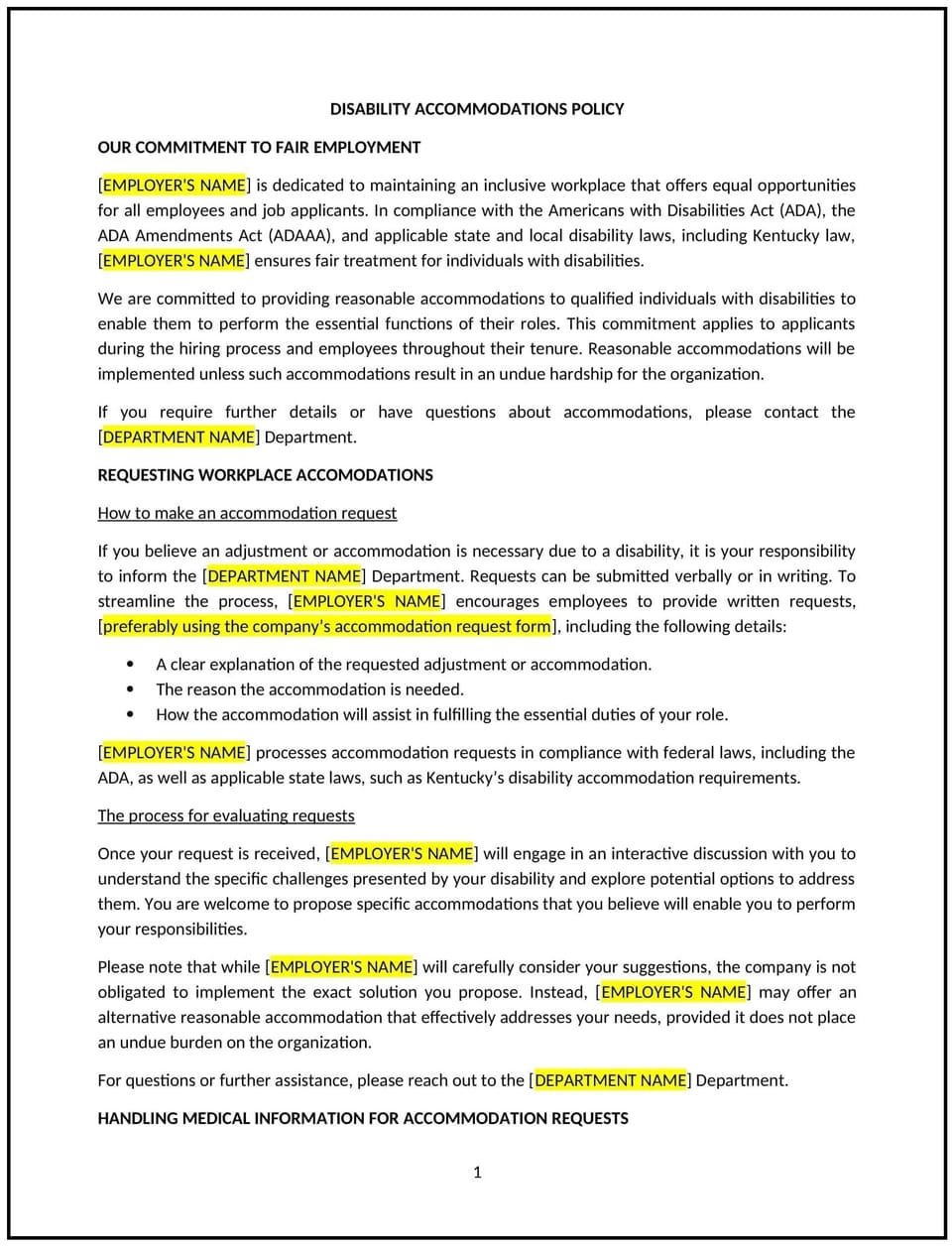Disability accommodations policy (Kentucky): Free template

Disability accommodations policy (Kentucky)
A disability accommodations policy provides Kentucky businesses with guidelines for supporting employees with disabilities by offering reasonable accommodations that enable them to perform their job duties effectively. This policy outlines the process for requesting accommodations, defines employer responsibilities, and supports compliance with the Americans with Disabilities Act (ADA) and Kentucky laws.
By adopting this policy, businesses can promote inclusivity, enhance workplace accessibility, and demonstrate their commitment to equal opportunities.
How to use this disability accommodations policy (Kentucky)
- Define reasonable accommodations: Clearly explain what accommodations may include, such as modified work schedules, assistive devices, or changes to the physical workspace.
- Outline the request process: Provide detailed steps for employees to request accommodations, including whom to contact, required documentation, and expected timelines.
- Establish an evaluation procedure: Explain how the business will assess accommodation requests, considering factors like effectiveness, feasibility, and potential undue hardship.
- Clarify employer responsibilities: Highlight the company’s role in providing accommodations, maintaining confidentiality, and ensuring a supportive process.
- Address employee responsibilities: Encourage employees to communicate their needs openly and participate in the accommodation process.
- Include dispute resolution: Outline steps for resolving disagreements regarding accommodation requests, such as involving HR or external mediation.
- Promote awareness and training: Provide education for employees and managers on disability rights, accommodations, and fostering an inclusive workplace.
Benefits of using this disability accommodations policy (Kentucky)
This policy provides several advantages for Kentucky businesses:
- Promotes inclusivity: Creates a supportive work environment that values diversity and equal opportunities.
- Enhances employee productivity: Provides employees with the tools and support they need to perform their roles effectively.
- Reduces legal risks: Helps businesses comply with the ADA and Kentucky disability laws, avoiding potential penalties or disputes.
- Strengthens workplace culture: Demonstrates the company’s commitment to fairness and respect for all employees.
- Encourages transparency: Establishes a clear and consistent process for handling accommodation requests.
Tips for using this disability accommodations policy (Kentucky)
- Communicate the policy: Ensure employees are aware of the policy and understand how to request accommodations through onboarding and regular updates.
- Maintain confidentiality: Protect the privacy of employees seeking accommodations by limiting access to sensitive information.
- Train managers: Educate supervisors on handling accommodation requests respectfully and in compliance with legal requirements.
- Monitor accommodations: Regularly review accommodations to ensure they remain effective and relevant to the employee’s needs.
- Review periodically: Update the policy as needed to reflect changes in Kentucky laws, ADA requirements, or workplace practices.
Q: What is the purpose of a disability accommodations policy?
A: The policy provides guidelines for supporting employees with disabilities by offering reasonable accommodations that help them perform their job duties effectively.
Q: What are examples of reasonable accommodations?
A: Examples include modified work schedules, assistive devices, ergonomic workstations, or adjustments to workplace policies.
Q: How can employees request accommodations?
A: Employees can submit requests by contacting their manager or HR and providing any necessary documentation, as outlined in the policy.
Q: How are accommodation requests evaluated?
A: Requests are assessed based on factors like effectiveness, feasibility, and whether they impose an undue hardship on the business.
Q: What role does confidentiality play in this policy?
A: The policy ensures that information related to accommodation requests is kept confidential and shared only on a need-to-know basis.
Q: What happens if an accommodation request is denied?
A: If a request is denied, employees may pursue the dispute resolution process outlined in the policy, which may involve HR or external mediation.
Q: How often should the disability accommodations policy be reviewed?
A: The policy should be reviewed annually or as needed to reflect changes in laws or workplace practices.
This article contains general legal information and does not contain legal advice. Cobrief is not a law firm or a substitute for an attorney or law firm. The law is complex and changes often. For legal advice, please ask a lawyer.


